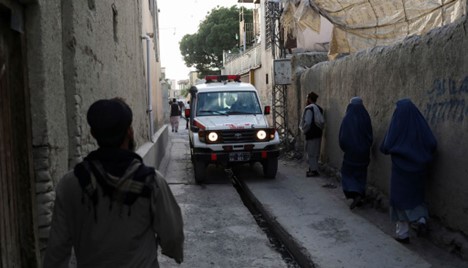The Islamic State group claimed two bomb blasts aboard minibuses that killed at least nine people Thursday in Afghanistan’s Mazar-i-Sharif, a week after a deadly explosion at a Shiite mosque in the northern city.
The number of violent public attacks across Afghanistan has fallen since the Taliban returned to power last August, but the Sunni Islamic State group has continued to target Shiites, whom they view as heretics. A string of deadly bombings targeting minority communities has convulsed the country in the past two weeks during the fasting month of Ramadan. Thursday’s blasts occurred within minutes of each other in different districts of Mazar-i-Sharif as commuters were heading home to break their dawn-to-dusk fast, Balkh provincial police spokesman Asif Waziri told AFP.
“The targets appear to be Shiite passengers,” he said, adding 13 people were wounded in the blasts. The regional Islamic State chapter, ISKP, took credit for the bombings, which it said inflicted 30 casualties. Images posted on social media showed one minibus engulfed in fire, while the other was mangled, with Taliban fighters seen transporting victims from the vehicle to hospitals.
The blasts came one week after an attack on a Shiite mosque in Mazar-i-Sharif killed at least 12 worshippers and wounded scores more.
That explosion was followed a day later by the bombing of another mosque in Kunduz targeting the minority Sufi community. It killed at least 36 people during Friday prayers.
In Kabul, another attack also targeted Shiites, with two bombs detonated at a school, killing six students. The jihadist IS claimed the mosque attack in Mazar-i-Sharif, but no group has so far taken responsibility for the bombing in Kunduz or at the Kabul school.
Shiite Afghans, who are mostly from the Hazara community, make up between 10 to 20 percent of Afghanistan’s population of 38 million. The regional branch of IS in Sunni-majority Afghanistan has repeatedly targeted Shiites and minorities such as Sufis, who follow a mystical branch of Islam.
IS is a Sunni Islamist group, like the Taliban, but the two are bitter rivals. The biggest ideological difference is that the Taliban pursued an Afghanistan free of foreign forces, whereas IS wants an Islamic caliphate stretching from Turkey to Pakistan and beyond. Taliban officials insist their forces have defeated IS, but analysts say the jihadist group remains a key security challenge.
Afghan government spokesman Zabihullah Mujahid told AFP earlier Thursday that several arrests had been made in connection with the string of recent attacks. “These attacks targeted places that did not have enough security like mosques and a school, but now we have stepped up security in such places,” he said.




